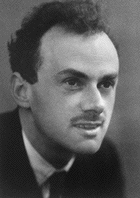![]()
 |
The interview with Paul Dirac was conducted by David Peat (DP) and Paul Buckley (PB) David Peat has kindly allowed Starlabís Jack Klaff (Public Understanding of Science) to publish it here It was aired as part of the Canadian radio series Physics and Beyond and later published in Glimpsing Reality: Ideas in Physics and the Link to Biology- interviews with leading 20th Century scientists Available - Amazon.com.
In addition to commenting theories of physics as he saw them in the 1970ís Dirac touches on the 'large number hypothesisí which was occupying him at that time. occupied him in recent years. Dirac has proposed that the large numerical constants of nature are interrelated. The large value of certain of these constants, Dirac supposed, is connected with the age of the universe.
It is worth repeating that the interview was not going well at all, but what makes this interview remarkable is how Dirac responds to a question about beauty, and how much easier the rest of the conversation became
The Interview David Peat (DP), Paul Buckley (PB) and P.A.M. Dirac
DP Do you feel that there is the same excitement today in physics that there was in the twenties and thirties?
Dirac: The problems are more difficult now and there is not the same hope of making rapid progress which there was in those days. Excitement is usually combined with the hope of making rapid progress, when any second rate student can do really first-rate work. But the easier fundamental problems have by now all been worked out. Those that are left are very difficult to work on, and one doesn't seem able to get the right basic ideas for handling them.
It is quite possible that they will require wholly new ideas. In fact it's pretty certain they will; otherwise they would already have been thought up.
PB But they will still be related to the existing development of theory in some sense at least.
Dirac: Yes. The present theory must be an approximation to any improved theory which we get in the future.
DP Some people we've spoken to seem to think it's a matter for new experiments, particularly in elementary particle physics.
Dirac: If the theorists are not good enough to solve it on their own, that's what one has to do. It needs an Einstein, or someone like that. Einstein didn't depend on new experiments to get his ideas.
DP Do you feel that the progress in particle physics is fruitful?
Dirac: It's not really fundamental; it's collecting a mass of information and one doesn't know really how to get the basic ideas from it. Just like in the early 1920s one had a mass of spectroscopic information and it needed Heisenberg to find the real basis of a new theory from that wealth of material.
DP Do you think a unification necessarily will have to include relativity ?
Dirac: I should think so, ultimately. Perhaps not gravitation in the first place; gravitation is rather separate from ordinary atomic physics and it plays very little role.
DP It seems to be an insurmountable problem to most people: the quantization of relativity. It is something you have worked on.
Dirac: One can deal with it up to a certain point, but one cannot complete the theory in a satisfactory way.
|